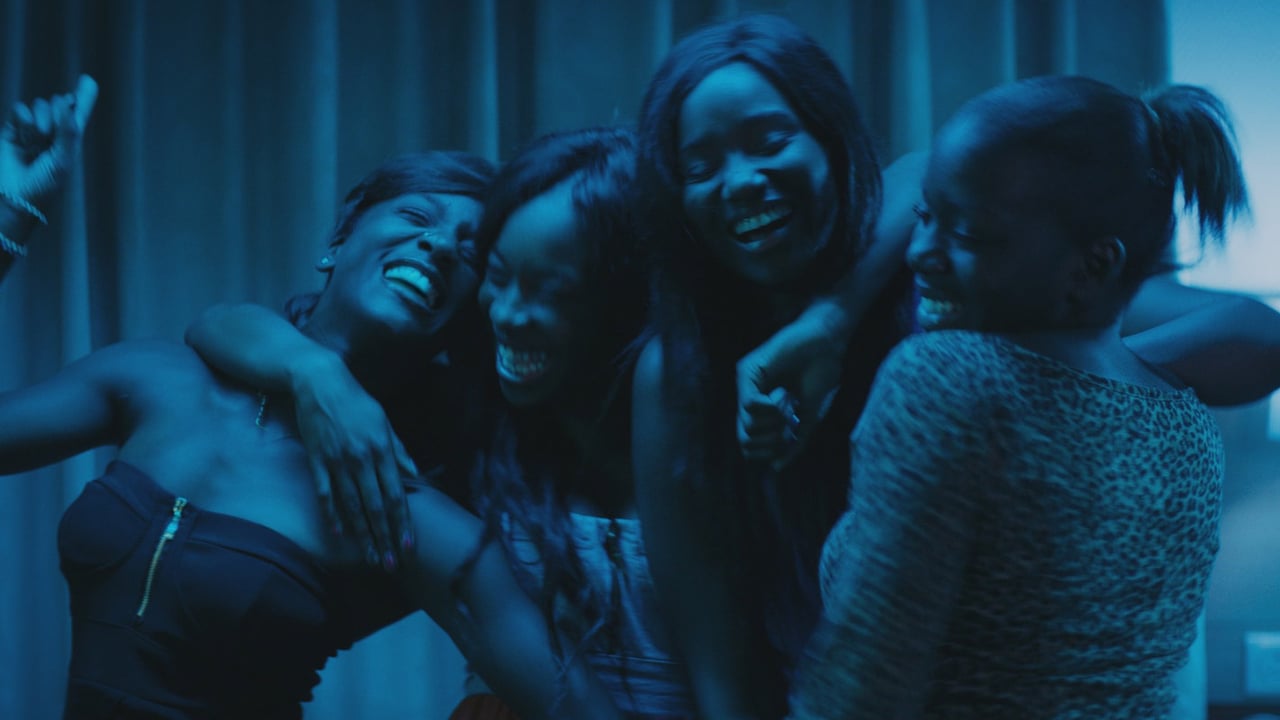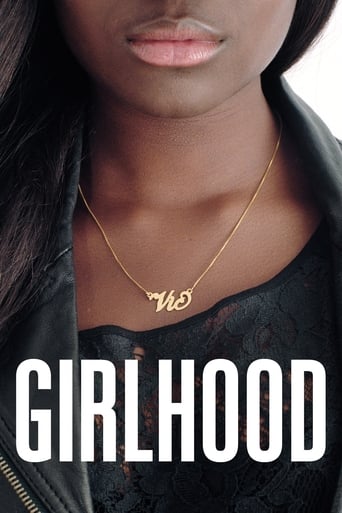

All-girl "gangs" may offer female teenagers a safe space to experiment with the trappings of womanhood - a step-up from childhood, but a transitional stage nonetheless. This social dynamic is explored in 'Girlhood', but against the backdrop of an impoverished, ethnic minority community in Paris, where every choice made has wider repercussions for life. Unfortunately, the film feels disjointed, in part because it doesn't seem to know whether it wants to celebrate this "girlhood", or look on aghast; of course real life isn't black and white, but the film seems to alternate between portraying these two extremes, instead of managing to paint a subtler shade. Beyond the fact that life's hard and people (and especially men) are hard as well, I didn't take too much away from this film.
... View MoreFrench director Céline Sciamma's new film is called "Girlhood," probably named that way in English to capitalize on last year's similar moniker, "Boyhood." But in French, it's translated as "Girl Gang," which to my ears is a more appropriate title. Citing the lack of French films dealing with black people, Sciamma, who is white, decided to hang out with some French-African teenagers to learn more about their culture and perhaps fashion a film based on her experiences. The resulting product features non-professional actors culled from what is usually referred to in the US as "the projects," rows of drab apartment buildings in a lower socio-economic section of the city.The opening scene is most telling as Sciamma depicts a group of high school girls playing American style football. As they walk home and continually pass by groups of loud, hostile-acting males, they gradually peel off, finally leaving us with the film's protagonist, Marieme, a 16 year old teenager who later refers to herself as "Vic" (for Victory).Marieme's mother is too busy working to pay much attention to the teenager's needs and her brother is a macho creep who occasionally physically abuses her. After she fails to get into college because of poor grades (and faced with the prospect of attending a vocational school instead), Marieme develops a crush on a boy who is friends with a gang of three girls—she soon falls in with the group and gradually is transformed from a shy teenager to an aggressive rebel.The leader of the three is Lady, whom the other girls look up to. Sciamma chronicles the misadventures of the girl gang as they traipse around Paris (mainly in shopping malls), shoplifting, extorting money from other girls and acting as obnoxiously as they can. Sciamma appears to take no stand on their behavior, merely depicting their loutish shenanigans as typical of wayward, rebellious teenagers. The main plot involves Lady's fall from grace after she is beaten up in a fight with a girl from a rival gang before a fairly large group of people. Lady retreats from public review after her father forbids her to pursue further rebelliousness activities. Marieme takes up the group's mantle when she in turn beats up the teenager who defeated Lady. Sciamma's gritty depiction of the activities of the girl gang and their rivals works well--akin to some of the more interesting cinema verité efforts here in the US. Not only does she capture their anti-social side with cogent verisimilitude but also highlights the teenagers' sense of camaraderie (the highlight being the group dancing to Rihanna's song "Diamaonds").Unfortunately, Sciamma's resolution to Marieme's story is not completely satisfactory. Marieme eventually parts with the rest of her group and begins working for a local drug dealer, Abou. At one point we see her disguising herself as a boy, perhaps to avoid being hit upon by rapacious males who are part of Abou's group. Later, Abou does just that at a party and Marieme declares she's through working for him. Marieme's boyfriend's suggestion that they get married falls on deaf ears and the aimless former gang leader is rebuffed after she tries to buzz herself into the family apartment.What are we supposed to conclude about Marieme's fate? Is she the victim of a society that favors the upper middle-class and the rich? Is it all racial—that because she's black, she can't get ahead? Or is it Marieme's own choices that stymie her? Perhaps she could have gone to vocational school instead of falling in with her girl gang rebels. Sciamma again perhaps takes no sides but her tale feels incomplete— perhaps we'll have to wait for the sequel to find out what happened to her.
... View MoreMarieme (Karidja Touré) is a sixteen-year-old, African-French girl living in a working class Paris suburb, where her poor academic performance results in no other option other than vocational school. Marieme's homelife is equally bleak, as she's often in the care of her abusive older brother, with no real friends or outlet of creativity to turn to. One day after school, she meets a gang of girls; lead by Lady (Assa Sylla), they are Fily (Marietou Tore) and Adiatou (Lindsay Karamoh), who ask if Marieme wants to hang out with them and enjoy a day of independence, free from school and the responsibilities of every day life. Marieme is instantly attracted by their sleek leather jackets, gold necklaces, and loud hairstyles, so she can't help but, overtime, develop a sense of attraction to them and their wily ways. It doesn't take long for Marieme to become invested in the gang's lifestyle, which concerns a lot of assimilation into their own everyday practices, such as relentless, bare-fisted fighting with other women in remote urban areas. The violence gets ugly and the lengths Marieme goes to be accepted are uglier.Céline Sciamma's Girlhood is a delightfully unconventional picture that truly shows the subtle takeover that many gangs have on people, and in this case, women, the demographic who is sort of accepted as being "too good for gangs" or more drawn to harmless cliques that innocently gawk at guys and discuss fashion trends. Sciamma goes for a brutal but tender picture, much like her last film Tomboy, a surprisingly gentle film about a ten-year-old girl searching for acceptance with her short hair and fluid gender identity.Where Tomboy spoke to young girls, Girlhood speaks to the demographic of young women that are handicapped, be it by finances, personal responsibilities, poor academic performance, or what-have-you to the point where joining a pack of dangerous women seems to be the only sane and logical thing to do. It's a scary thought but Sciamma depicts it in a way comparable to that of Larry Clark or Harmony Korine, where the film doesn't adhere to a slippery slope structure, where we're essentially watching the demise of a character before a rise even occurs. Sciamma doesn't subject her Marieme character to constant abuse that grows worse and worse, in an almost sadistic and self-damning way. Instead, she follows her along in a realistic manner, through multiple hairstyle changes and even an eventual identity overhaul in hopes that she'll find some semblance of solace with herself.Many can see Marieme's problem a mile away and that's the fact that she's trying to solve her personal problems by filling the hole with other people, which, in a long-term sense providing a close relationship with males or females is built, will only result in mistreatment and abandonment on her part. Marieme is trying to find solace in others when she should be spending more time alone, searching for herself instead of falling prey to the vicious acts of gangmembers she barely knows. However, this is where Sciamma's film becomes a multilayered examination of the troubled female heroine; we can either view her choices as that of an naive young girl pining for acceptance or somebody who is trying to figure out what she wants and taking pride in group identity.However you view Marieme and Sciamma's general purpose for Girlhood, certain ideas and attributes about the film hold up in their own, less ambiguous way. For starters, Sciamma goes for a long and aesthetic that relies heavily on vignettes and a lack of pacing in the conventional sense. Her pacing is very loose, and unfortunately, this lack of a cleaner structure finds itself all over the board in the way the film wants us, the audience, to react. Her pacing, and overall aesthetic, resembles that of a potboiling soap opera in that, no matter how Sciamma decides to position her characters or her camera, everything still feels like something alone the lines of a soap opera in terms of its look and feel. This is a somewhat distracting attribute, especially for a film nearing two hours in length and running on a rather minimal plot.With that, Touré's performance is quite the standout, given that for the twenty-year-old's first acting gig she is left to carry a lion's weight of the film on her back in addition to having a character without a fundamental identity. Much like the young Zoé Héran's Laure in Tomboy, Touré finds ways to make Marieme speak to young women who have found themselves lost and without a healthy creative option to turn to amidst a bleak outlook. This sets up Sciamma for her many idiosyncratic insights into the gender fluidity of her female subjects in a manner that gives Girlhood a stamp of cold-cut realism and honesty films of this nature are hard to come by.Starring: Karidja Touré, Assa Sylla, Lindsay Karamoh, and Mariétou Touré. Directed by: Céline Sciamma.
... View MoreI really enjoyed this movie. 9/10 I will cut off a foreign film but I was intrigued so I turned on the subtitles and stuck it out until the end. However, I think I could have followed the film without the subtitles at a certain point. When I read, gang in the description, I thought it'd be a very rough film but the friendship that was formed between the girls were beautiful. The decisions that were made by the characters were understandable due to their lives and circumstances. Though I may not agree with decisions I can understand them which isn't always the case sometimes. It didn't lose me until the last act. I don't feel like it was as tight, put together and well written as it was in the beginning. I understood, she'd rather live the life uncertainty than go back home but I just didn't have closure, I felt like all of the characters' fates were just as uncertain as I was, especially the main characters. I just felt left hanging and I wanted to know what happened to her.
... View More